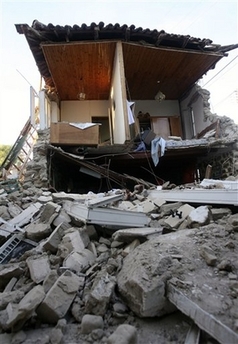A strong earthquake with a preliminary magnitude of 6.5 struck southwestern Greece on Sunday, killing at least two people, injuring more than 100 and leveling dozens of homes, authorities said.

A home lays destroyed in the village of Kato Ahagia, Greece, following an earthquake on Sunday June 8, 2008. A strong earthquake with a preliminary magnitude of 6.5 struck southwestern Greece on Sunday, killing at least two people, and injuring more than 100 others, while destroying some dozens of homes. [Agencies]
It was Greece's first fatal earthquake since 1999, when a 5.9 magnitude quake near Athens killed 143 people and left thousands homeless.
Sunday's quake struck at 3:25 p.m. near the port city of Patras, about 120 miles west of Athens in the northwestern Peloponnese, the Athens Geodynamic Institute said. It was felt as far away as southern Italy.
Two people were killed and 120 were injured, Interior Minister Prokopis Pavlopoulos said. By nightfall, six of the injured remained hospitalized.
One man was killed by a falling pergola outside his home in Kato Ahaia, a village near the epicenter, while a woman who had only been slightly injured in the quake died later in the hospital of a heart attack, Pavlopoulos said.
"My thoughts in these hours are with our fellow citizens who are suffering," Prime Minister Costas Karamanlis said in a statement from Vienna, Austria, where he was on a three-day visit. "I want to stress and underline that the state will be at (their) side."
Karamanlis was to cut his visit to Austria short and return to Greece on Monday.
Frequent aftershocks rattled already frightened residents, and seismologists urged caution, particularly around buildings damaged in the initial quake.
"We are watching the seismic activity with great attention. We are not yet certain that the danger is completely over," said Athens Geodynamic Institute director Gerasimos Papadopoulos.
Although it was unlikely there would be a stronger quake, he said, "there is still concern."
With dozens of houses destroyed or severely damaged, the government said it would give $4,680 to anyone who had lost their primary home in the quake. Authorities also said they would set up tents for those left homeless and distribute food.
Military helicopters and transport planes, and a specialized Air Force rescue crew were placed on standby, the National Defense General Staff said.
Teams of rescuers from 17 Balkan and Mediterranean countries who had just arrived in Greece for a disaster response training exercise joined in rescue efforts.
The quake damaged the air traffic control tower of the Andravida military airport, but a secondary tower was being used and the airport remained open, the general staff said.
Two families — seven people in total — were rescued after being trapped in houses that collapsed, one in the village of Fostaina, about 20 miles south of Patras, the other in the village of Vartholomio, authorities said.
Television footage showed rescue crews pulling a 9-year-old girl from beneath the rubble of her house in Fostaina after a two-hour rescue effort and placing her on a stretcher. The girl suffered only slight injuries.
"I have seen nothing like that in my lifetime," an 88-year-old woman in Kato Ahaia, told state-run NET television. "When the earthquake began, I was in bed. I tried to leave but fell down. I crawled on my knees to the front door."
She said neighbors got her out of the house.
Hours after the quake, terrified residents stayed away from their homes, gathering in village squares and outdoor coffee shops. Local authorities cordoned off unsafe buildings, and ordered all schools in the area to remain shut Monday.
The Tourism Ministry and Greek tourist board said no damage had been reported in any of the area's hotels and that no tourists had been hurt.
The interior minister said the damage was relatively light.
The fire service said a landslide cut off part of the Corinth to Patras highway.
The U.S. Geological Survey gave a preliminary magnitude of 6.1 for the quake, while the Athens Geodynamic Institute gave a preliminary magnitude of 6.5. Magnitudes often vary in the first hours or days after an earthquake.
Greece is one of the world's most earthquake-prone countries, but most quakes cause no injuries.
(China Daily June 9, 2008)